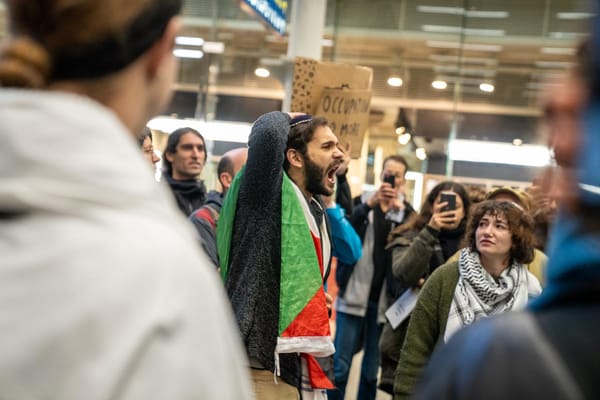Germans are rising up against AfD. Their problems go far deeper
Revelations about a ‘masterplan’ for ethnic cleansing have triggered historic protests across Germany. But off the streets, centrists are bending to far-right demands.

For around a month, cities across Germany have been awash with demonstrations against the far-right Alternative für Deutschland (AfD) party. The trigger for this unprecedented protest wave was a bombshell investigation exposing a secret meeting in November, at which AfD officials gathered with an assortment of neo-fascists to discuss a “masterplan” to expel millions of people with a non-German background from the country – including citizens.
The plan was presented by Martin Sellner, a leader of the alt-right Identitarian Movement in Austria. As noted in the exposé, his audience included Roland Hartwig, a senior AfD aide and “unofficial general secretary of the party”, as well as some junior politicians from the conservative Christian Democrats (CDU), wealthy donors and key figures of the German far-right including “die-hard Nazis” and neo-Nazis. Together they discussed concrete strategies to ethnically cleanse Germany and undermine barriers such as the constitutional court.
The party is currently polling at around 20% nationwide and is on track to become the second largest party in the Bundestag in next year’s federal election. State elections later this year will offer an early indication of their prospects.
The antifascist demonstrations seen in recent weeks have been some of the largest in Germany’s modern history. On one January weekend, over a million people took to the streets – not only in metropolitan centres but also in small provincial towns. The German government has firmly embraced the protests, with Chancellor Olaf Scholz (Social Democrats or SPD) and foreign minister Annalena Baerbock (Greens) attending a large rally in Potsdam – the site of the secret meeting – during the first week of demonstrations.
At the same time, however, the government continues to attack the rights of migrants and lurch ever further to the right. The Left Party, now alone in the Bundestag in defending migrants without reserve, is weaker than ever after an anti-immigration faction split away last year. And with opinion polls showing only a minor dip in AfD’s popularity since the investigation was made public, it is far from clear how this mass mobilisation will put the brakes on the party and the policies it promotes.
A vehicle for Nazi revival
While AfD’s rabidly neoliberal economic programme has won it the support of billionaires, the party has been savvy enough to present itself as both a respectable voice of the middle class and a protest vote for the disaffected working class. It has also been effective at playing to sensationalist media and drumming up xenophobic sentiment and a German form of the “anti-woke” culture war.
It has garnered particularly strong support in the formerly communist East, which was devastated as its industries were sold off and shut down after the Berlin Wall fell and much of the population fled for the West. At the same time, neo-Nazis from the West swept in to bolster their eastern allies and stir up the dejected population against the liberal state, establishing the eastern countryside as a far-right stronghold. It is these states where AfD has made the greatest strides since its 2013 founding, in local councils and state parliaments.
Public debate has largely accepted AfD’s own narrative of its success, attributing it primarily to Germans’ concerns about immigration. This narrative undermines the left’s attempts to criticise the austerity policies and dismantling of social protections under both conservative and centre-left governments since the turn of the millennium – which have left so many in Germany fearing for their social standing and basic needs, and searching for scapegoats.
Drawing voters from the far-right, conservatives, the centre and even the left, AfD has succeeded in playing to a broad base while also serving as a platform for neo-Nazis. As the party has gained traction in state and federal elections, its hard-right ethnonationalists have gained ground internally. A leader of this current, Björn Höcke, heads the party’s branch in the eastern state of Thuringia, whose population will go to the polls in September and may well elect Höcke to form the party’s first state government.
Höcke’s faction within the party was formally dissolved in 2020 after the federal Office for the Protection of the Constitution concluded it was an endeavour against Germany’s constitutional order. The constitutional watchdog has increasingly classified elements in the party as “extremist” and placed them under surveillance.
Figures like Höcke repeatedly cause scandals by using old Nazi slogans, maintaining ties with Nazis, expressing antisemitic views and downplaying Nazi crimes. Yet despite these indications that AfD is a vehicle of Nazi political revival, the party has largely avoided the universal scorn reserved for neo-Nazis.
As with many far-right forces around the world, one way it has done so is by outdoing an already extreme pro-Israel consensus among German political parties, which it holds up as proof that it cannot be antisemitic. No less important, however, is the fact that AfD has been able to mould the rest of the German political spectrum in its own image.
The centre will not hold
On the one hand, all the other parties in the Bundestag have maintained a ban on cooperation with AfD, a policy termed Brandmauer or “firewall” against the right. The ban goes as far as avoiding putting forward any bill that would need AfD votes to pass. While this policy bolsters the party’s underdog posturing, it has succeeded in denying it any direct parliamentary achievements.
On the other hand, the “firewall” does not prevent the other parties from adopting aspects of AfD’s politics. Indeed, all parties of the centre – not only the opposition CDU, but also the coalition parties SPD, Greens, and right-liberal Free Democrats – have adopted increasingly anti-immigrant politics, supposedly to respond to the same popular will on which AfD is capitalising.
Indeed, just a week after the publication of the exposé, the government passed a new anti-immigration bill – the Repatriation Improvement Law – stripping further protections from asylum seekers while criminalising the maritime rescue of children. Only weeks prior, the German government had facilitated the European Union’s Common Asylum System (CEAS), which critics such as aid group Medico International described as a “de facto abolition of the individual right to asylum”.
Responding to the revelations about AfD’s ethnic cleaning plans, chancellor Scholz tweeted: “Anyone who lives here, works here, and is committed to the fundamental values of our democracy, is one of us.” While rejecting the notion that ethnicity or “race” ought to be reasons to exclude people from German society, this kind of response reinforces the right’s notion that employment status and political positions are grounds for the denial of rights. Moreover, Scholz had appeared on the cover of Der Spiegel in October with a quote that could have come from the secret AfD meeting itself: “We must finally deport on a grand scale.”
Many of the anti-AfD protestors have therefore had little patience for the Scholz coalition’s embrace of the demonstrations, calling out their xenophobia no less than that of the far right. But despite such widespread sentiment on the streets, the parliamentary left appears to be in no position to galvanise broad support around internationalist, cosmopolitan class solidarity.
In October, after years of public acrimony, the faction of the Left Party led by Sahra Wagenknecht broke off from the bulk, presenting a moderate anti-immigration and social conservative position paired with social democratic economics. While this “left-populist” strategy, intended to undermine AfD in its strongholds, may have contributed to a slight dip in the far-right party’s support in recent polls, it has diminished the power of the Left Party in the Bundestag, placing it at acute risk of falling below the 5% electoral threshold in next year’s federal election.
Israel as a wedge and a bridge
Naturally, CDU, the biggest opposition party, has sought to stake out a position between the government’s soft xenophobia and AfD’s ethnonationalism. Around the very time of the secret November meeting, a leading Christian Democrat – Markus Söder, party leader in Bavaria and state prime minister – publicly proposed that dual citizens should have their German citizenship stripped if they are not “committed to our values and our constitution”.
The context of these comments is instructive: Söder was commenting on the proliferation of pro-Palestinian demonstrations in light of Israel’s assault on Gaza, and he floated denaturalization as a measure to combat antisemitism. Germany’s “fight against antisemitism” – increasingly cast in terms of unquestioning support for Israel’s government above all else – effectively undermines the centre and left’s pluralist commitments, driving a wedge between antifascists and allowing sections of all parties to make common cause with AfD.
As far back as the Yugoslav wars of the 1990s and especially in the wake of the post-9/11 “war on terror”, Germany’s gradual remilitarization has been promoted as a means of preventing others from going down the genocidal path Germany once tread, and especially as a means of protecting Israel. These “historical duties” have also garnered widespread public support for US-led military interventions, even among the once-pacifist Greens and Left Party.
In recent years, a xenophobic discourse shifting concerns over domestic antisemitism to focus on the “imported antisemitism” of migrants and their comrades – or rather, opposition to Israel’s myriad abuses against Palestinians – has opened up deep fissures between the established antifascist left and the very “foreigners” they stand up for when opposing AfD. This was evident at some of the anti-AfD demonstrations in January, where Palestinians and their allies reported being yelled at, spat at and even physically assaulted by other protestors. Indeed, critics have noted that these demonstrations have been overwhelmingly white, without a visible migrant contingent.
Rally organisers have sought to bridge these divides and actively welcome the pro-Palestinian contingent. Yet the underlying tensions dividing Germany’s antifascist camp against itself persist.
Social Democrats and Greens have not only rushed to harshen the mistreatment of migrants, but have been leading the charge to remilitarize Germany, while the Left Party is split between the Wagenknecht group – which consistently opposes militarism but seeks to intensify deportations – and the remainder, which consistently protects migrants but has been unable to take a stand against the Israeli military’s extensive war crimes in Gaza, aided and abetted by the German government. A clear opposition to wars and closed borders, once the keystone positions of the German left, is no longer on the ballot.
Where next?
With few credible prospects of an electoral victory over the right’s agenda in the near term, the anti-AfD protests have left many wondering how the party’s ascent can actually be stopped. Debates have intensified over the possibility of banning the party outright – but this process would take years, might fuel protest voting for the far right and, if it fails, critics warn, may finally pave the party’s road to power. In the meantime, it remains to be seen how effective the government’s newly announced legal measures to quell the upsurge will be.
For the moment, it is clear that grassroots antifascist work is as urgent as ever, though radical shifts in social policy are needed to truly dry out the wells of alienation and despair upon which the neo-fascists draw. The myriad contradictions of the German political system seem to undermine at every turn the very goal for which the system was designed after the Nazis’ defeat: preventing a return to fascism. Crucial avenues for struggle abound, but causes for optimism remain in short supply.▼
Michael Sappir is a leftist writer and organiser from Israel, based in Berlin.




